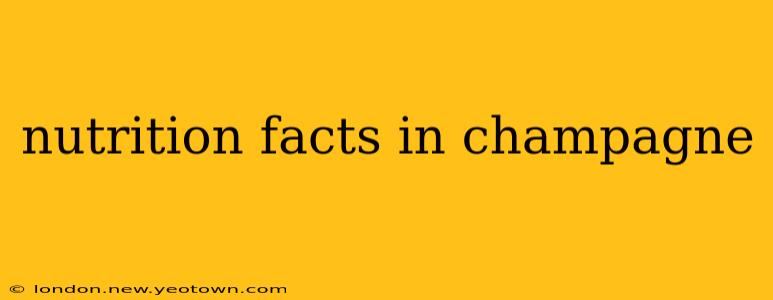Champagne. The name conjures images of celebrations, romance, and sophisticated gatherings. But beyond the effervescence and elegant bubbles, what's actually in that glass? Let's pop the cork on the nutritional facts of champagne and explore what makes this celebratory drink tick.
This isn't just about calories (though we'll cover those too!). We'll explore the components of champagne, delve into potential health impacts, and address some frequently asked questions surrounding its nutritional profile. Consider this your ultimate guide to understanding the nutritional side of this beloved beverage.
What are the main nutritional components of champagne?
Champagne, at its core, is fermented grape juice. This means it contains a variety of naturally occurring substances. While the exact nutritional composition can vary based on the brand, the grape varietals used, and the production methods, some key components generally include:
- Carbohydrates: Primarily in the form of sugars, though the amount varies depending on the dryness (brut, extra dry, etc.). The fermentation process consumes most of the initial sugars, but residual sugar remains, contributing to sweetness and calories.
- Alcohol: This is the main active component, providing calories and influencing the drink's effects on the body. A standard serving (approximately 5 ounces) contains roughly 12% alcohol by volume.
- Calories: The caloric content is largely determined by the alcohol and residual sugar levels. Generally, a standard serving falls between 80-100 calories.
- Antioxidants: Grapes are rich in antioxidants, and some of these beneficial compounds survive the winemaking process. These antioxidants are linked to various potential health benefits.
How many calories are in a glass of champagne?
The caloric content of champagne can fluctuate, but a typical 5-ounce serving usually contains between 80 and 100 calories. However, this number can increase with sweeter varieties, as the added sugar directly contributes to the calorie count. It's important to remember that consuming multiple glasses will significantly increase your overall calorie intake.
Is champagne good for your health? Does it have any health benefits?
This question is complex. While moderate champagne consumption has been linked to potential health benefits by some studies, it's crucial to understand the caveats. The potential benefits often stem from the antioxidants present in grapes, which are associated with cardiovascular health. However, these potential benefits are easily overshadowed by the negative impacts of excessive alcohol consumption. Moderate consumption is key—and "moderate" is generally defined as one drink or less per day for women and up to two drinks per day for men.
Excessive champagne consumption can lead to various health problems, including liver damage, weight gain, and increased risk of certain cancers. Always consume alcohol responsibly and in moderation.
Does champagne contain sugar?
Yes, champagne does contain sugar, though the amount varies greatly depending on its style. "Brut" champagne, often considered the driest, typically has the lowest sugar content. However, even brut champagne still contains some residual sugar from the fermentation process. Sweeter styles like "demi-sec" and "doux" contain significantly higher sugar levels.
What are the effects of champagne on the body?
The effects of champagne on the body are primarily determined by its alcohol content. Alcohol is a depressant, affecting the central nervous system. Moderate consumption can lead to feelings of relaxation and mild euphoria. However, excessive consumption can cause impairment of judgment, coordination problems, and other negative consequences. Remember that alcohol interacts differently with individuals based on factors like body weight, metabolism, and overall health.
Conclusion: Enjoy Responsibly
Champagne is a celebratory beverage enjoyed worldwide, but understanding its nutritional composition allows for informed enjoyment. While it does contain some beneficial antioxidants, the calories and alcohol content necessitate mindful consumption. Always prioritize responsible drinking habits and enjoy champagne in moderation as part of a balanced lifestyle.

